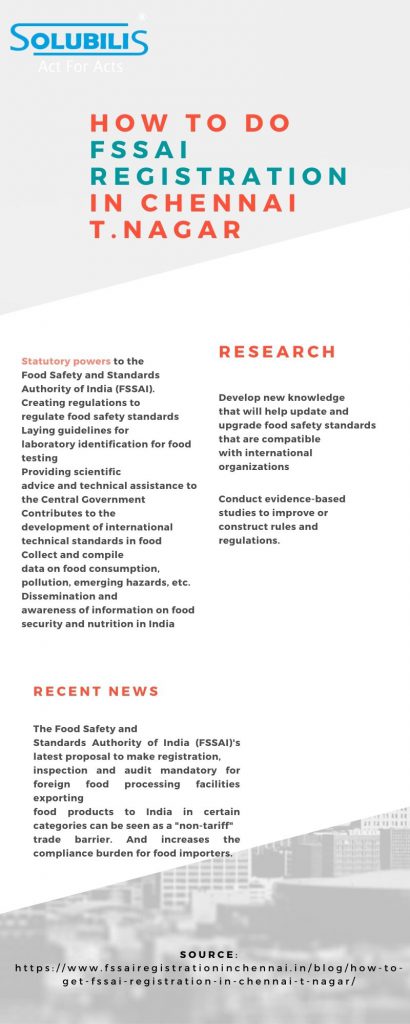How to do Fssai registration in Chennai T.Nagar?

TALK TO EXPERTS
The Food Safety & Standards Act, 2006, which was introduced to improve food hygiene and quality, has brought about tremendous changes in the food industry. By law, a person may not start or continue any food business except under FSSAI license or FSSAI registration. Therefore, any food preparation or processing or packaging or distribution company is now required to obtain FSSAI license or registration.
The FSSAI license is issued by the Food Health and Standards Authority of India (FSSAI), Ministry of Family Health and Welfare. The application to start a food business should be submitted to FSSAI in the prescribed format. Based on the application and supporting documents, FSSAI approves.
History of FSSAI

FSSAI was implemented by the former Union Minister of the Government of India, Dr. Anbumani Ramadoss, on 5 August 2011 under the Food Safety and Standards Act, 2006. FSSAI has a Chairperson & 22 members. FSSAI is responsible for setting standards for food so that there is a body to deal. There is no confusion in the minds of consumers, traders, manufacturers and investors. Ministry of Health and Family Welfare, Government of India Administration Ministry of Food Safety and Standards Authority. The FSSAI Act, 2006 gives the following statutory powers to the Food Safety and Standards Authority of India (FSSAI).
Creating regulations to regulate food safety standards
Laying guidelines for laboratory identification for food testing
Providing scientific advice and technical assistance to the Central Government
Contributes to the development of international technical standards in food
Collect and compile data on food consumption, pollution, emerging hazards, etc.
Dissemination and awareness of information on food security and nutrition in India
Research

The FSSAI registration in Chennai T.Nagar has given some guidelines for food safety research. The Research and Development Division is also taking research with the following objectives:
Develop new knowledge that will help update and upgrade food safety standards that are compatible with international organizations
Conduct evidence-based studies to improve or construct rules and regulations.
Quality assurance
FSSAI is mandated to perform various functions related to food quality and standards. These functions, in addition to others, include “laying out procedures and guidelines for notification of laboratories accredited in accordance with ISO17025.” The FSSAI informed the classified laboratories:
FSSAI notifies NABL accredited labs – 112
State Labs-72
Referral Labs-14
Who requires the FSSAI registration?
All food processing plants, including re-labels and re-packers
The turnover of FOB should not exceed 12 lakhs and its production capacity should not exceed 100 kg per day
Dairy units, including the milk chilling house, are equipped to handle or process
FOB capacity up to 500 liters per day or up to 2.5 metric tons per year
Vegetable oil production units through solvent extraction and refining plants, including vegetable oil processing units and oil expeller unit
Turnover up to 12 lakhs per annum.
Participated in FBO Slaughter
Large animals up to 2 animals
Small animals up to 10 numbers
Poultry birds 50 numbers per day
FBO processing meat products
Turnover up to 12 lakhs per annum.

FSSAI Functions
The standing committee on Health and Welfare submitted its report on the functioning of FSSAI registration. It is responsible for the science based food standards and regulating all the sectors of food like distribution of food, storage and sale.
Regulatory framework
FSSAI committee noted that even after more than 1 decade of enactment of FSSAI Act, 2006 FSSAI yet to frame the regulations, of food testing laboratories, genetically engineered foods, among the others. FSSAI is unable to find the areas are yet to formulate or amend. It has been under the observation that most of the FSS department had no implementation in many of the states. Hence the result is, food adulteration, lack of quality checks, sale of the defective food, misleading labeling. It has been notified that those areas must have been specified in the Act within one year.
Licensing and Registration:
Under this Act, no person can start or continue any food business without obtaining a license. The committee noted that many food businesses operate without a license or with expired licenses. Furthermore, licenses have issuance by the central and state licensing authorities on the basis of incomplete documents. It also stated that the rate of denial of licenses for renewal was very low. The Committee recommended that the FSSAI review all licenses issued under the previous system. It had given by the product approvals and that licenses had revoke and re-issuance under the current policy of product approvals.
Food Safety Surveys:
The Committee is of the view that the FSSAI has left the task of conducting surveys to the States, but the States are not ready to conduct the surveys. However, no survey had a conduct for the implementation of this law. FSSAI also does not have a database on food businesses. Therefore, it recommended that the FSSAI and state food authorities conduct surveys on food businesses within their jurisdiction.
The committee noted that most food laboratories (used by FSSAI and state food safety officials to test food samples) lacked laboratories, manpower and functional food testing equipment, resulting in an error in testing food samples. It said there were 266 laboratories in the country, most of which did not have the facilities to test the required parameters such as heavy metal, pesticide and bacterial contamination. The committee recommended a uniform approach of examinations across the country to obtain accurate results. In addition, it recommended that each state formulate its own recruitment regulations and conduct routine examinations to fill vacancies in laboratories.
Recent news

The Food Safety and Standards Authority of India (FSSAI)’s latest proposal to make registration, inspection and audit mandatory for foreign food processing facilities exporting food products to India in certain categories can be seen as a “non-tariff” trade barrier. And increases the compliance burden for food importers.
In a move to surprise food importers, the FSSAI is removing amendments to import regulations, and has proposal in some categories – based on food safety risk analysis – that registration, inspection and audit be mandatory for foreign food processing facilities that had export to India. The FSSAI did not specify food categories in its draft regulation. But industry players consider categories such as meat, dairy, water, baby food or products for special food purposes to be high-risk food production categories. The regulator has now sought shareholders’ views on the proposed food safety and standards (import) amendment regulations in 2020.

